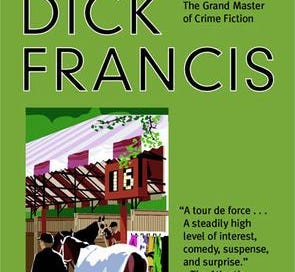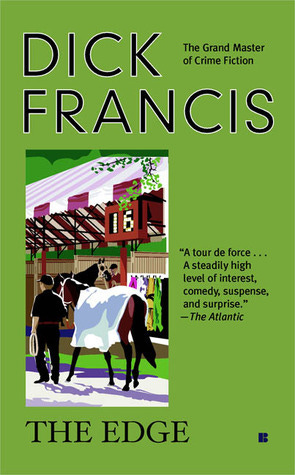I Read a Book About Horses and I Don’t Even Like Horses
Perhaps I won't always be a neigh-sayer.
The Edge by Dick Francis revolves around horses. As this post’s title says, I don’t like horses (or care about most quadrupeds, for that matter). But I do like mysteries and I do like trains, and those are the other two focuses of this book.
We follow Tor, a man who works for the Jockey Club Security Service as a sort of silent investigator, a job that requires covert observation and the ability to connect dots, remember faces and be a fly on the wall. The Service has been trying to nail down a horse-related criminal by the name of Filmer, but to no avail; his trial ended in a “not guilty” verdict. They know he’s bad and it’s just a matter of finding the right evidence. When Filmer unexpectedly purchases a share of a Canadian horse and a ticket on The Great Transcontinental Mystery Race Train, Tor is sent to see if he can’t find the required evidence and stop a new disaster.
“But,” I said, and stopped dead, my mind full of urgent reservations and doubts that I was good enough for a job like that. Yet on the other hand, what a lark.
Pick any sport—car racing, swimming, cycling, skiing, running etc.—add a high-stakes race, and suddenly I want to see who wins. There’s something about striving to overcome an impossible obstacle and winning at the last second, that pulls me in. Personal anecdote: I hate swimming, but I was so pumped watching Michael Phelps swim (I believe it was for his final time) at the Olympics. Like, one second away from yelling “AMERICA! YEAH!” at the tv. I felt a bit silly, but I was very invested in the outcome. I still hate swimming though.
At the close of this story, we get a race and I was hoping for one of the horses to win and it did and I was very happy it won. What’s also nice about the story is the author clearly knew horses (he was a jockey), but I never felt inundated with useless horse knowledge or too much horse knowledge; it was actually easier to follow the horse/race stuff than the human angle.
That’s my biggest issue with this book: there are a lot of characters, and they don’t all have a strong personality. There are the people Tor works for, then we have the horse owners/handlers, then the staff on the train, and the actors performing the mystery during the journey. It’s a lot to keep track of.
I think having a mystery play out on a train ride is a great idea and something I’d love to see in real life, but it adds another layer to an already teetering plot. The fake mystery does become a vehicle for revelations concerning the real mystery: it’s a way to scare the perpetrator and inform the victims in a fairly benign fashion. But I still think it kinda clogs the book.
Because it’s in first-person, Tor is obviously zeroed in on Filmer and what he’s doing and who he’s associating with, both on the train and at the racetrack. This means that people who are already on the periphery are sidelined even more and many of the people are just given a name and one or two traits. This made it difficult for me to separate everyone and I’m glad I read the e-book because I could quickly find a few people to remind myself of their identity. I think most of the characters are given some sort of physical description, but that goes in one eye and out the other for me, so I normally end up relying on someone’s personality to identify them, which is why if they don’t have a distinct one, that’s gonna be a strike against the book. I’m not super wowed by these characters but I do think this book would work really well as a miniseries.
Tor is a likable guy, though perhaps due to his enigmatic and chameleonic job, doesn’t have as defined a personality as I would prefer. He’s adaptable and easygoing and when faced with risk and worry, comports himself well, even with the nerves and fear thrumming beneath his surface. It’s strange that he doesn’t have a vibrant tone, since this book is in first-person. I think one of the points of choosing first-person is so you can completely inhabit the character’s mind and essentially become them. Tor feels distant, as though he’s observing his own actions and tailoring it to be a bit clinical. I think he would be a fun character to watch, hence my desire for a miniseries, but he doesn’t do himself justice in the prose.
Aside from the mystery train aspect, what drew me in to this book is the writing. I knew from the first page that this guy could write. Sometimes the punctuation is a bit wonky and maybe it could’ve been fifteen pages shorter—that’s me being a picky critic—but the author’s English sense of humor and way of describing things is delightfully different.
Filmer’s effect on people’s guts, I reflected, would put any laxative to shame.
She glanced up briefly and didn’t exactly say I was a thundering nuisance, but looked as if she thought it.
I like the time period as well: it was written in the 1980’s, so no one has cellphones or the internet, but it’s just modern enough to have some convenient things available (like small cameras), and yet old-fashioned enough that people have to use their brains and bodies to get things done instead of electronically hacking their way to answers and instantly receiving info via text message.
All the books the author wrote are about horses, but that is not a turnoff now that I know he could write, so I will certainly seek out more of his work.
Thanks for reading! Don’t forget to like, comment, share, and subscribe if you haven’t yet! You can support my work by upgrading to a paid subscription or leaving a tip on my Buy Me A Coffee page.






I don't like horses either. I also don't particularly care for dogs, but I liked "Travels with Charley." Just goes to show how a good author can make you forget he's talking about stuff you don't really care about. Good review.